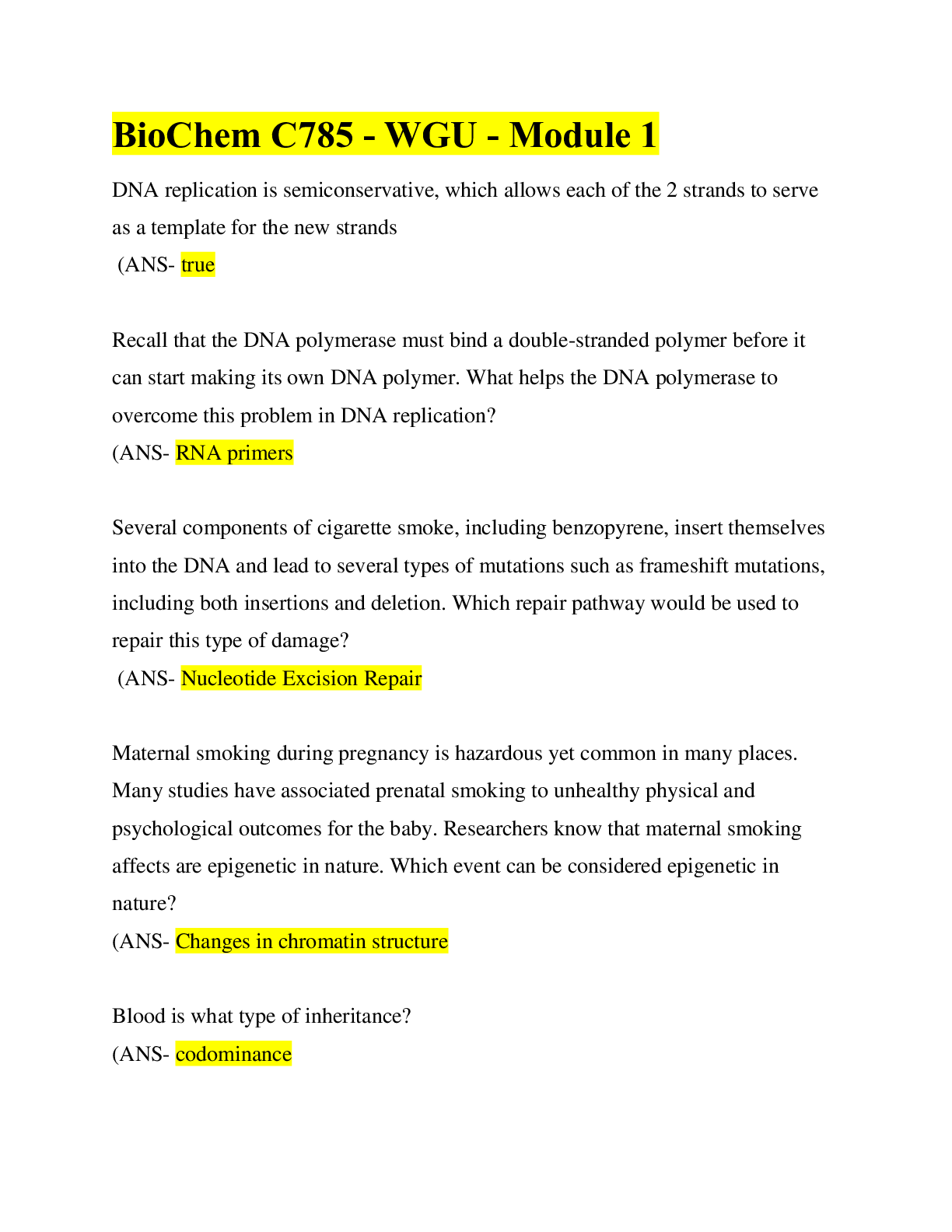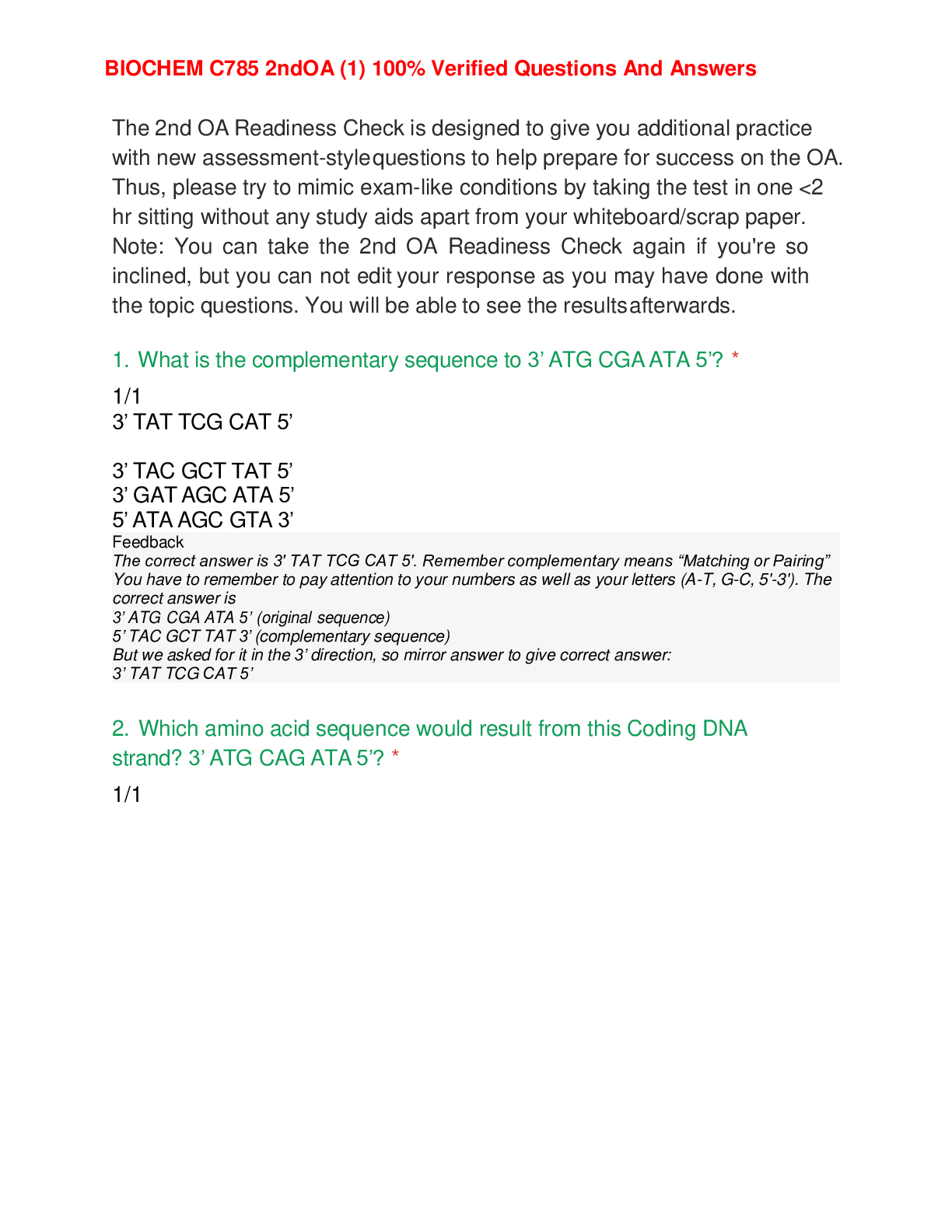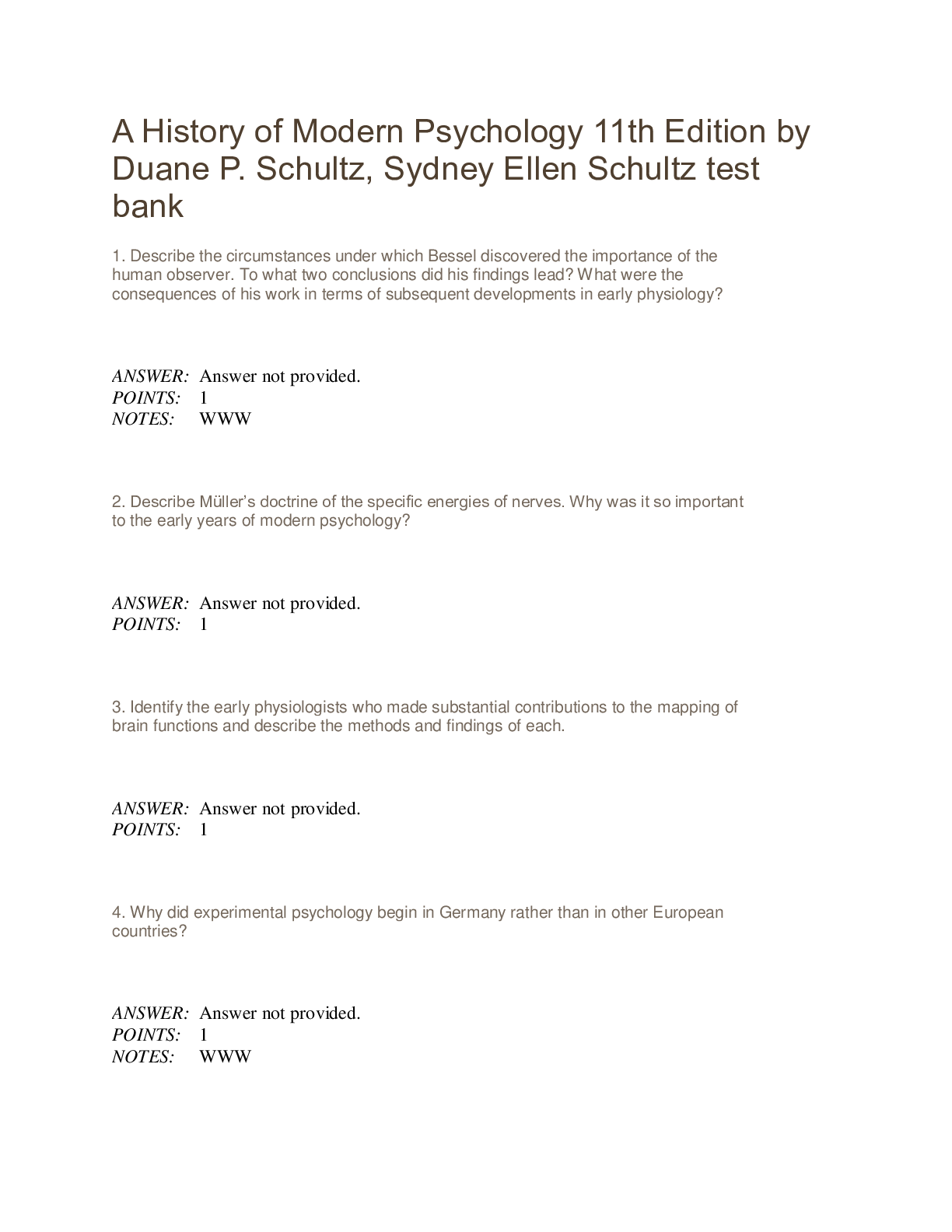History > STUDY GUIDE > A HISTORY OF MODERN PSYCHOLOGY 11TH EDITION TEST BANK grade A + (All)
A HISTORY OF MODERN PSYCHOLOGY 11TH EDITION TEST BANK grade A +
Document Content and Description Below
A History of Modern Psychology 11th Edition Test Bank True / False 1. A course in the history of psychology is a typical requirement for only 10% of undergraduate degree programs in psychology. a. ... True b. False ANSWER: False REFERENCES: Why Study the History of Psychology? QUESTION TYPE: True / False 2. Virtually every modern science includes a course on its history as a part of its curriculum. a. True b. False ANSWER: False REFERENCES: Why Study the History of Psychology? QUESTION TYPE: True / False 3. The authors of your textbook argue that the formal study of the history of psychology is the most systematic way to integrate the areas and issues that constitute modern psychology. a. True b. False ANSWER: True REFERENCES: Why Study the History of Psychology? QUESTION TYPE: True / False NOTES: WWW 4. Psychology is one of the oldest and one of the newest scholarly disciplines. a. True b. False ANSWER: True REFERENCES: The Development of Modern Psychology QUESTION TYPE: True / False 5. It can be argued that psychology today studies and debates some of the same questions as those that concerned the philosophers of ancient Greece. a. True b. False ANSWER: True REFERENCES: The Development of Modern Psychology QUESTION TYPE: True / False NOTES: WWW 6. The earliest possible starting point for psychology is approximately 1,000 years ago. a. True b. False ANSWER: False REFERENCES: The Development of Modern Psychology QUESTION TYPE: True / False 7. The distinction between modern psychology and its roots has more to do with the kinds of questions asked than with the methods used. a. True b. False ANSWER: False REFERENCES: The Development of Modern Psychology QUESTION TYPE: True / False 8. Reconstruction refers to the principles, methods, and philosophical issues of historical research. a. True b. False ANSWER: False REFERENCES: The Data of History: Reconstructing Psychology’s Past QUESTION TYPE: True / False 9. The data of history are much like the data of science. a. True b. False ANSWER: False REFERENCES: The Data of History: Reconstructing Psychology’s Past QUESTION TYPE: True / False 10. Although difficult to do, the data of history can be reconstructed or replicated. a. True b. False ANSWER: False REFERENCES: The Data of History: Reconstructing Psychology’s Past QUESTION TYPE: True / False 11. The papers and diaries of Ebbinghaus and Fechner were found more than 70 years after their deaths. a. True b. False ANSWER: True REFERENCES: The Data of History: Reconstructing Psychology’s Past QUESTION TYPE: True / False 12. The written record of Darwin’s life and work is now complete. a. True b. False ANSWER: False REFERENCES: The Data of History: Reconstructing Psychology’s Past QUESTION TYPE: True / False 13. Jung wrote his autobiography a. True b. False ANSWER: False REFERENCES: The Data of History: Reconstructing Psychology’s Past QUESTION TYPE: True / False 14. The terms id, ego, and superego were improperly translated from German. a. True b. False ANSWER: True REFERENCES: The Data of History: Reconstructing Psychology’s Past QUESTION TYPE: True / False NOTES: WWW 15. Freud’s original term for free association was Einfall, which means an intrusion or an invasion. a. True b. False ANSWER: True REFERENCES: The Data of History: Reconstructing Psychology’s Past QUESTION TYPE: True / False 16. In his autobiography, Skinner recounts that his graduate days at Harvard were filled with endless work. a. True b. False ANSWER: True REFERENCES: The Data of History: Reconstructing Psychology’s Past QUESTION TYPE: True / False 17. Current evidence demonstrates that Freud’s works were ignored or even renounced by intellectuals during his lifetime. a. True b. False ANSWER: False REFERENCES: Contextual Forces in Psychology QUESTION TYPE: True / False 18. The term Zeitgeist refers to the spirit of the times. a. True b. False ANSWER: True REFERENCES: Contextual Forces in Psychology QUESTION TYPE: True / False 19. Three examples of contextual forces in psychology are economic opportunity, war, and prejudice. a. True b. False ANSWER: True REFERENCES: Contextual Forces in Psychology QUESTION TYPE: True / False 20. By 1960, the prejudice against women entering prestigious graduate schools of psychology had ended. a. True b. False ANSWER: False REFERENCES: Contextual Forces in Psychology QUESTION TYPE: True / False 21. The first African American to earn a doctoral degree in psychology was Kenneth Clark. a. True b. False ANSWER: False REFERENCES: Contextual Forces in Psychology QUESTION TYPE: True / False 22. Instances of simultaneous discoveries of theory support the naturalistic concept of scientific history. a. True b. False ANSWER: True REFERENCES: Conceptions of Scientific History QUESTION TYPE: True / False NOTES: WWW 23. The Zeitgeist is most influential in the naturalistic theory of history. a. True b. False [Show More]
Last updated: 2 years ago
Preview 1 out of 19 pages

Buy this document to get the full access instantly
Instant Download Access after purchase
Buy NowInstant download
We Accept:

Reviews( 0 )
$13.00
Can't find what you want? Try our AI powered Search
Document information
Connected school, study & course
About the document
Uploaded On
Jun 01, 2021
Number of pages
19
Written in
Additional information
This document has been written for:
Uploaded
Jun 01, 2021
Downloads
0
Views
78








.png)

.png)




